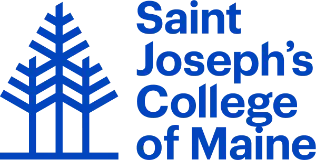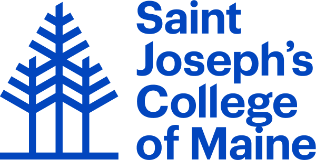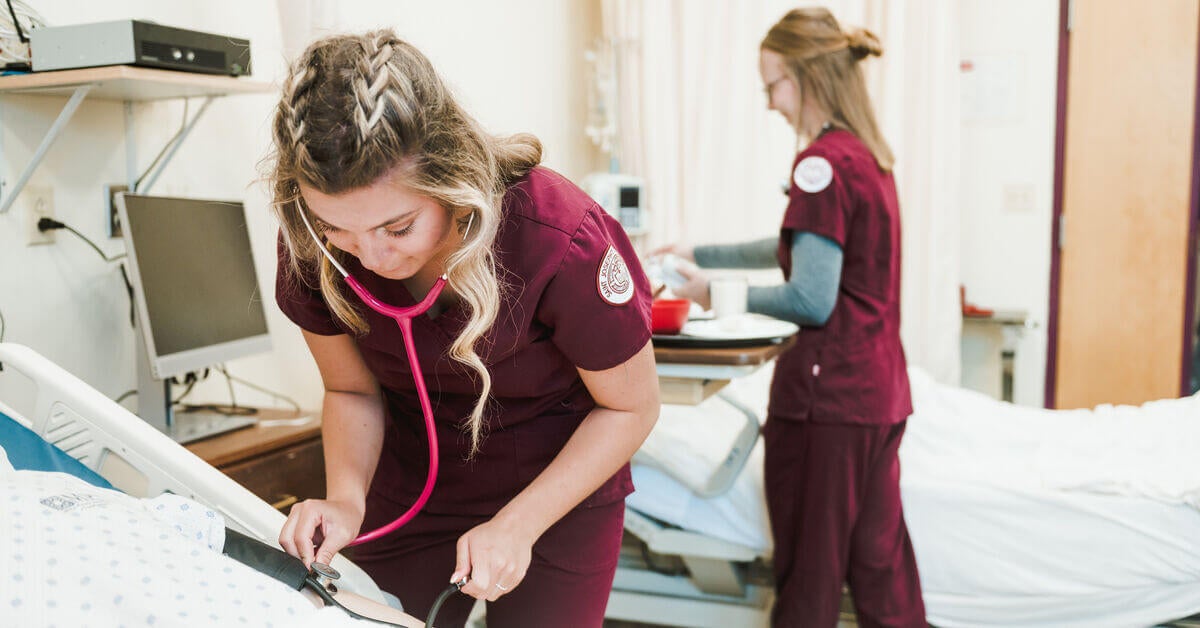How Can You Become an RN in One Year?
There is a pressing need for newly graduated registered nurses to fill vacancies nationwide. The U.S. Bureau of Labor Statistics (BLS) estimates a 5% growth in nursing roles by 2034. Retirements in the nursing workforce and an aging patient population will translate into an estimated 203,000 new RN jobs each year.
Aspiring registered nurses typically complete four-year undergraduate degrees before sitting for licensing exams. One-year nursing programs like the Hybrid Accelerated Bachelor of Science in Nursing (ABSN) at Saint Joseph’s College of Maine provide a condensed curriculum and are cost-effective alternatives to the traditional model. Accelerated programs can be anywhere from 12-16 months long to complete. Let’s see how these one-year nursing programs help professionals switch from jobs in other fields to rewarding careers as registered nurses.
Meeting Admission Requirements
Four-year BSN programs are primarily designed for recent high school graduates. As such, their admission standards focus on academic performance and extracurriculars at the high school level. The accelerated one-year nursing program at Saint Joseph’s College takes 15 months to complete and is geared toward second-career nurses with bachelor’s degrees in other disciplines.
ABSN applicants submit official transcripts from their previous universities to the college’s admissions office. The minimum standard for admission is an undergraduate GPA of 3.0 within 10 years of application. Transcript reviews particularly focus on student performance in science courses at the foundations of nursing careers.
Saint Joseph’s College requires all ABSN applicants to complete prerequisites prior to the first day of class. The following classes and minimum grades demonstrate sufficient knowledge for an accelerated course of study:
- Anatomy & Physiology I & II with lab* (C or above)
- Chemistry/General Chemistry/Organic Chemistry with lab* (C or above)
- Introduction to Psychology (C or above)
- Microbiology with lab* (C or above)
- Nutrition (C+ or above)
- Statistics (C or better)*
*Labs must be completed in-person. Options are available for in-person science labs, some exceptions apply.
Completing Coursework and Clinical Placements
A one-year nursing program is possible because of a curriculum entirely focused on professional training. Four-year programs require the completion of general education requirements prior to admission into BSN studies. Saint Joseph’s College acknowledges the value of previous undergraduate work by focusing on key nursing skills.
Course requirements for this ABSN program are fulfilled through a combination of live lectures and self-paced study. Nursing students complete all of their courses online with the exception of two on-campus workshops. The 57-credit curriculum builds clinical and professional skills during classes on topics like:
- Evidence-Based Practice
- Health Assessment
- Introduction to Professional Nursing
- Nursing Care of Children
An important component of one-year nursing programs is the supervised clinical rotations. ABSN candidates apply what they’ve learned in virtual classrooms to real-world situations during 590 clinical hours. The college’s clinical placement team identifies patient-facing opportunities local to students that are supervised by nursing professionals.
Applying for State Licensure
The application process for registered nursing licenses immediately follows graduation from a BSN program. Each state sets its own standards for licensure though many share similar requirements. For example, Maine’s checklist for registered nursing licensure includes the following items:
- Completed application with a $75 fee and current photo
- Proof of legal residency in Maine
- Final transcripts from conferring institution
- Criminal background check
- $200 registration fee for the NCLEX-RN exam
NCLEX-RN registration takes place at least 45 days after graduation when the state Board of Nursing sends an Authorization to Test email. This exam is designed by the National Council of State Boards of Nursing to evaluate readiness for the nursing profession. Test takers complete questions in eight Client Needs categories during the five-hour exam:
- Management of Care
- Pharmacological and Parenteral Therapies
- Physiological Adaptation
- Safety and Infection Control
- Reduction of Risk Potential
- Health Promotion and Maintenance
- Psychosocial Integrity
- Basic Care and Comfort
College coursework and NCLEX-RN study guides prepare aspiring nurses for the test’s requirements. This computerized-adaptive test (CAT) requires a minimum of 85 completed questions to determine if the taker achieves the passing standard. The test ends when the CAT system reaches 95% certainty about the taker’s success or failure relative to this standard.
Benefits of a Nursing Career
Success on the NCLEX-RN exam and completed application materials result in a registered nursing license. The long-term demand for registered nurses creates a competitive job market throughout the United States. These conditions lead to competitive salaries for nurses with a $93,600 median salary and $132,680 for the top 10 percent of earners.
Registered nurses in the 43 states participating in the Nurse Licensure Compact (NLC) also find flexibility in job locations. Licensed nurses in NLC states can practice in other NLC states without applying for new licenses. This flexibility means that nurses can choose the right opportunities for their personal and professional needs.
The National Center for Health Workforce Analysis (NCHWA) found 89% of registered nurses were extremely or moderately satisfied in a national survey. Empathetic and caring nurses find satisfaction in helping patients of all ages through their health challenges. The one-year nursing program at Saint Joseph’s College trains second-career nurses for fulfilling professional experiences in 15 months.
Why Study at Saint Joseph’s College of Maine?
Saint Joseph’s College is a regional leader in nursing education. Nursing Schools Almanac placed No. 31 out of 90 universities in its 2024 rankings of best nursing schools in New England. The college also holds accreditation from The Commission on Collegiate Nursing Education (CCNE).
Students in the accelerated one-year nursing program benefit from the college’s Center for Nursing Innovation. This state-of-the-art facility houses five simulation laboratories for hospital and home care training along with enhanced anatomy labs. ABSN students also benefit from a floor of collaborative spaces and advising offices.
In addition to its strong academic reputation and hands-on learning environment, students are drawn to Saint Joseph’s online ABSN program for its balance of flexibility and structure. The hybrid format allows aspiring nurses to complete rigorous coursework from home while still benefiting from meaningful, high-quality clinical preparation on campus.
This model supports students who may be changing careers, working part-time, or managing family responsibilities, offering them a realistic path to becoming practice-ready nurses in just one year.
The program’s supportive faculty, personalized advising, and thoughtfully designed virtual learning tools help students feel connected and confident throughout their journey, making Saint Joseph’s a trusted choice for those seeking both convenience and community in their nursing education.
Hear from a student
For hybrid ABSN student Genevieve Norton, the ABSN program represents a meaningful step toward a flexible, patient-centered nursing career where she can serve her community and grow into the nurse, she has long aspired to become. She especially values the responsiveness of the faculty and the quality of the learning experience, noting that “I feel like I’m getting heard when I talk to professors. It actually feels like I’m having a conversation with a person and not an AI chatbot.”
Graduates of the ABSN program carry Saint Joseph’s values throughout their careers. The college community focuses on “solidarity of the marginalized” in line with its Catholic roots. Nursing students - like previous generations of Saint Joseph’s graduates - model the college’s core values including:
- Excellence
- Integrity
- Community
- Respect
- Compassion
- Justice
- Faith
Request a brochure today to learn more about the college’s Hybrid ABSN program.


